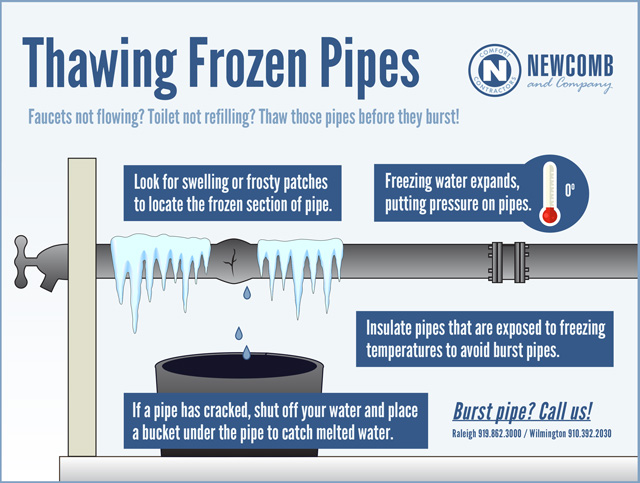WHAT TO DO IF YOUR WATER PIPES FREEZE
Jan 22, 2019

If your water pipes freeze, water won’t come out of your tap. Frozen pipes are a serious inconvenience. When toilets won’t refill and showerheads barely drip, you put tasks on hold as you scramble to fix the problem.
If your pipes freeze, how can you thaw them and reclaim control of your domestic plumbing? Here’s what you need to do.
Did Your Pipes Freeze?
First, check the weather. Water freezes at 32° Fahrenheit. If the temperature outside has been warmer than that, your pipes have not frozen.
If the temperatures have dipped below 32° and no water is coming out of your faucet, you may have frozen pipes. Look for leaks and make sure you have your water turned on. If you don’t see anything out of the ordinary, you might have a frozen pipe.
Find the Frozen Section
If your pipe is exposed to the elements, it could be in danger of freezing. Follow the pipes to locate sections that might be especially affected by weather changes. (While you’re at it, check your condensate line, too!) When pipes freeze, they may develop a coating of frost. In some cases, the pipe can bulge as the ice begins to expand.
Frozen pipes may be located inside an exterior wall. If your pipes freeze inside your wall, call a plumber right away. A burst pipe inside a wall could cause thousands of dollars in water damage.
Thaw the Pipe
There are several ways to thaw a frozen water pipe. From hair dryers to heat lamps, anything you do to heat the frozen area will help. Be sure to safely position any heat sources you use to thaw your pipes. Too much heat can cause plastic or PVC pipes to melt. You can thaw a frozen pipe by:
- Using a hair dryer
- Putting a space heater or heat lamp a few feet away from the pipe
- Wrapping a heating pad or hand warmers around the frozen area
- Placing a water bottle filled with hot (but not boiling) water next to the frozen pipe
Pipes should not be overheated. You can use heat tape for some types of pipes, but not others. Check the packaging before applying heat tape to ensure it is safe for your pipe.
If Your Pipes Freeze and Crack…
First, shut off the water. If you didn’t notice or get to the frozen pipe before it burst, turn off the water to your house. Put a bucket under the pipe to catch any drips, and call an experienced plumber right away! Tell the technician that you have a burst pipe, so he or she knows it is an emergency.
Be Proactive
Take steps to prepare your home for winter before the weather gets too cold. Then, you might not have to deal with frozen pipes at all. Many cold weather problems can be avoided if you take preventive action beforehand. Go to work before the temperature drops below 32°. Insulate any exposed pipes with foam wrap. In the evenings, let your faucets drip a bit. You may also leave a pipe dripping slightly overnight when a winter storm is on the way. Flowing water is less likely to freeze.
Keeping your home energy efficient can also help insulate your pipes and keep the cold air outdoors. This can protect you from frozen pipe issues and high energy bills.
Contact Newcomb and Company
If harsh winter weather has foiled your best efforts and your pipes have frozen, cracked, or burst, call Newcomb and Company. A certified Raleigh plumbing technician will take care of it as soon as possible, so your life isn’t disrupted.
Need help? Call now.